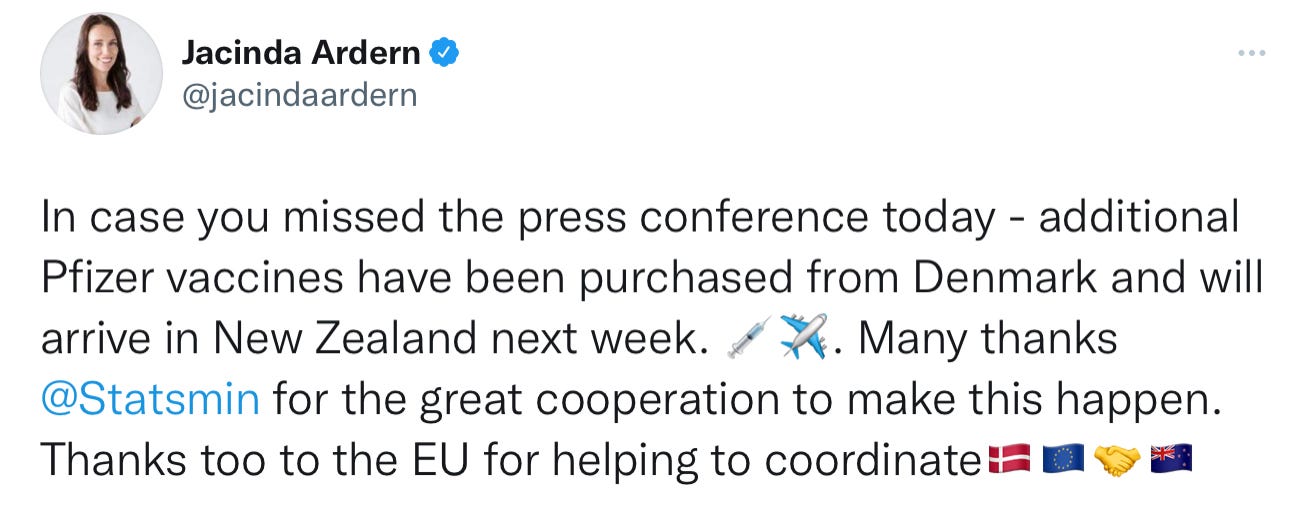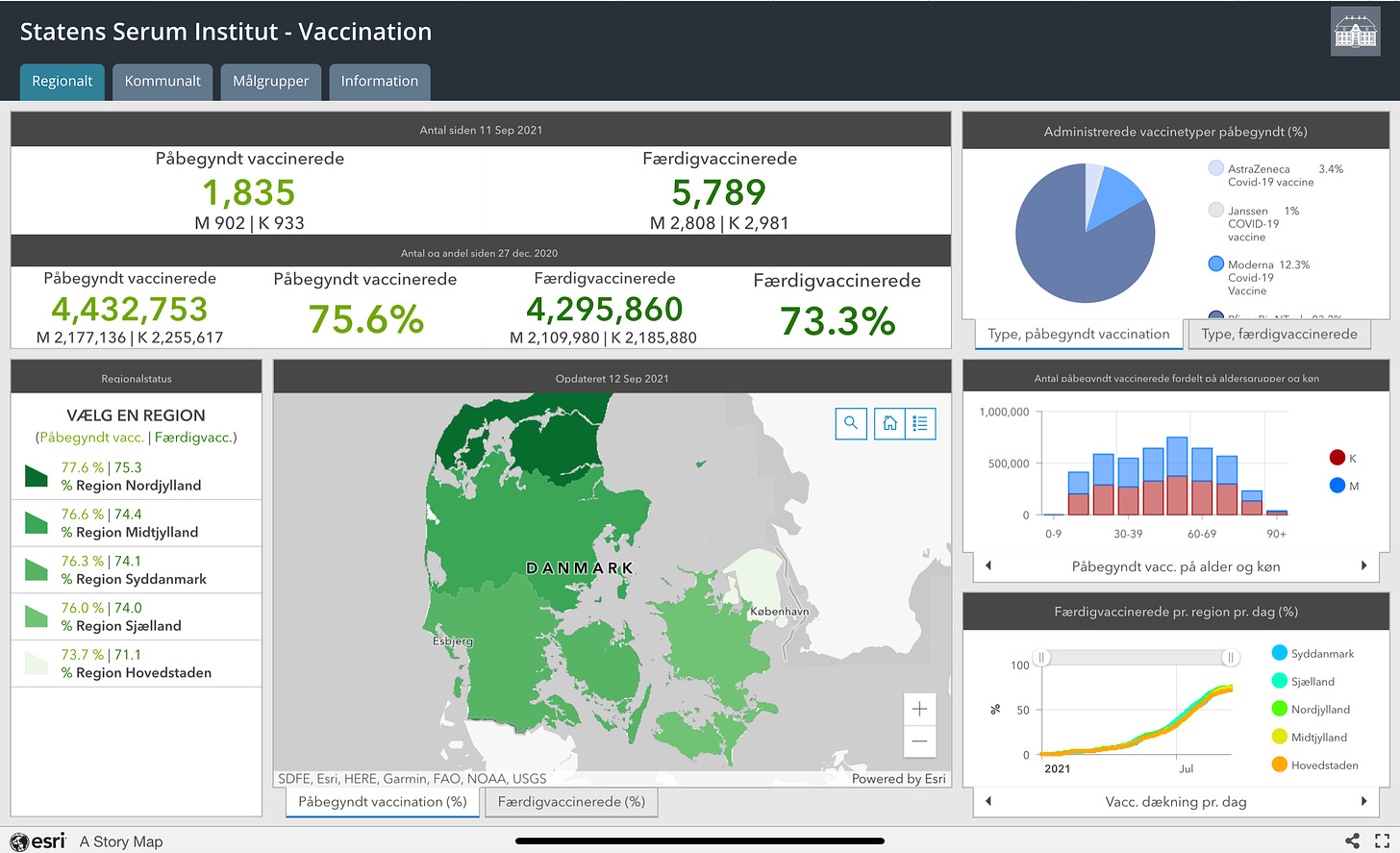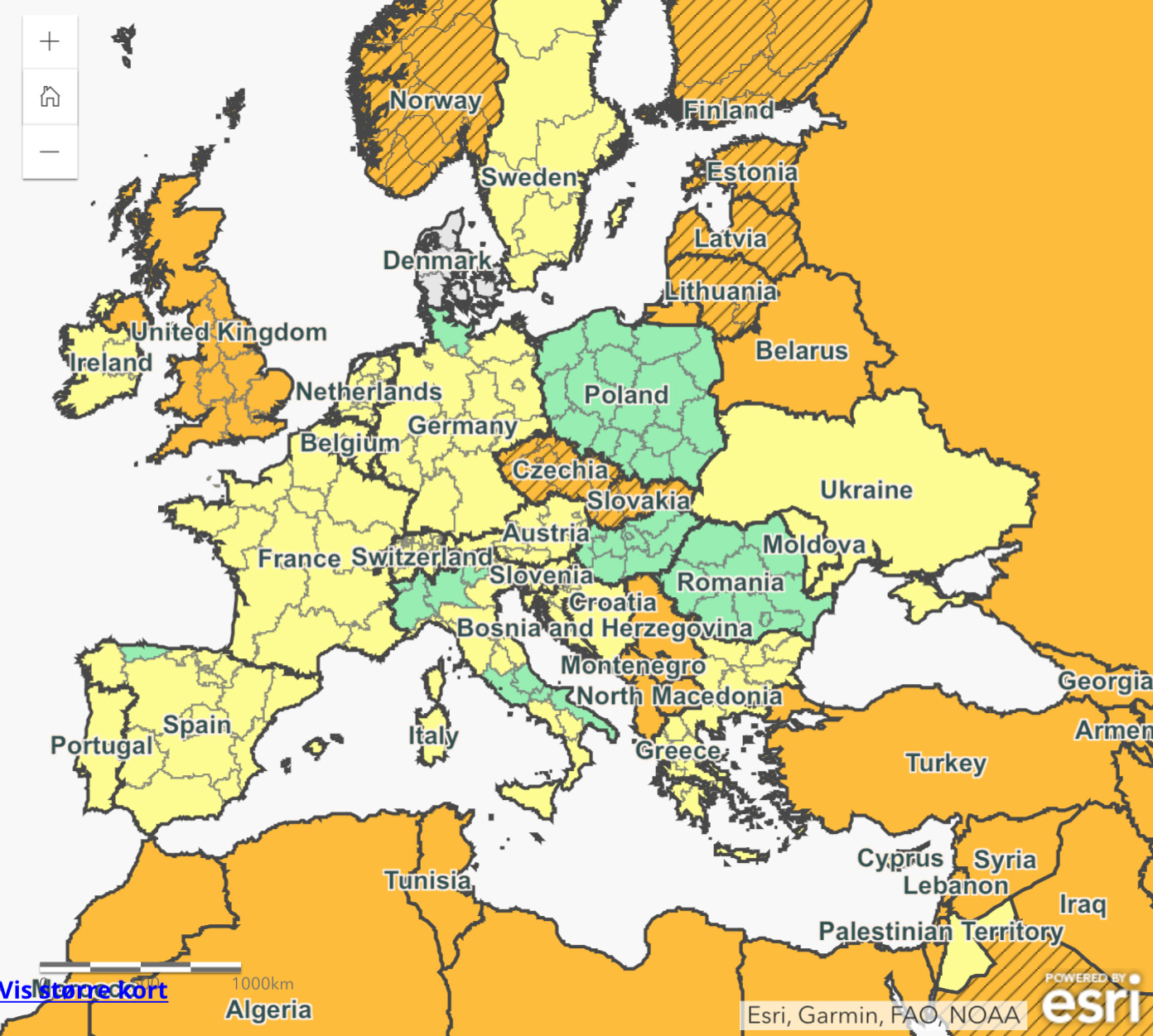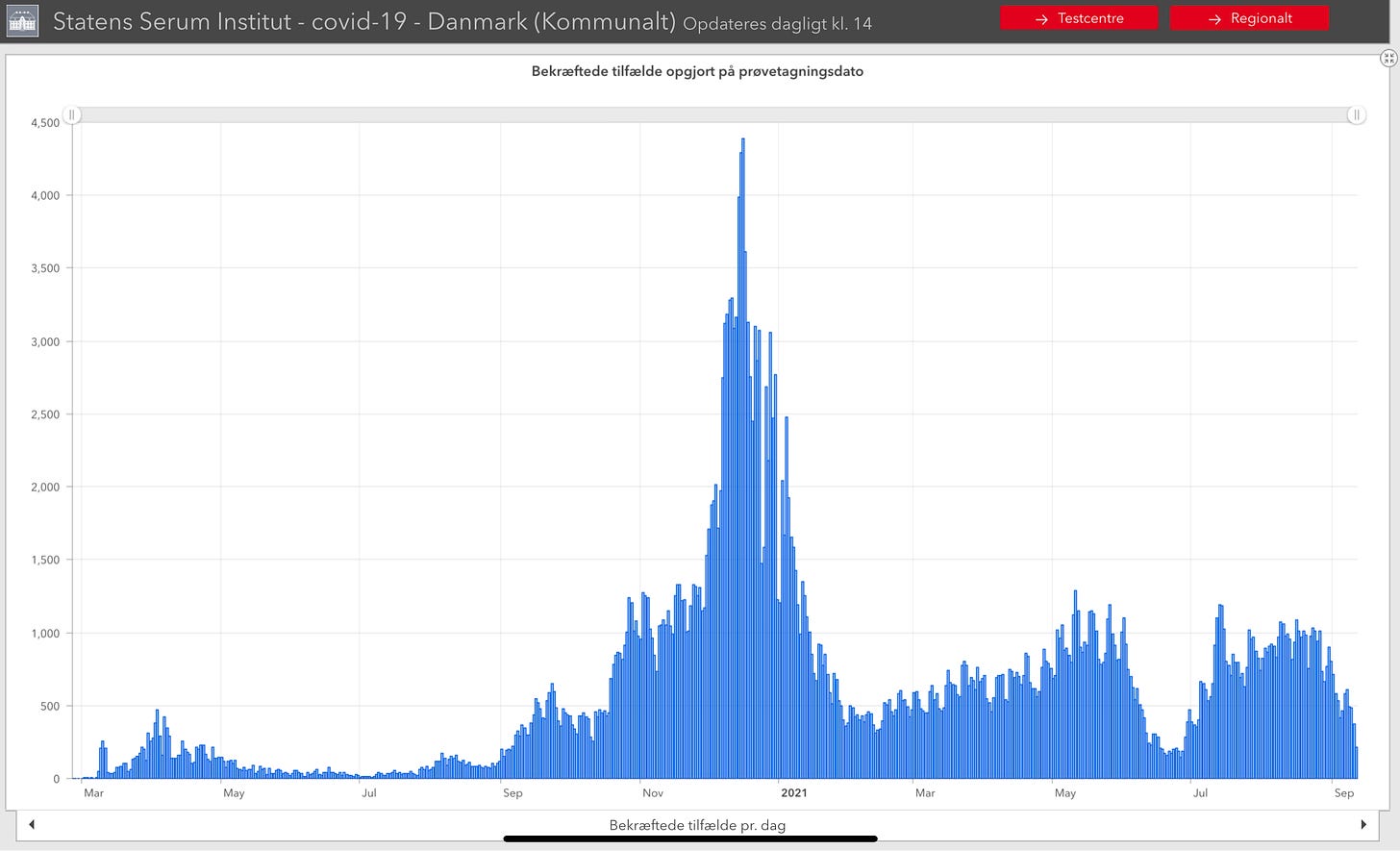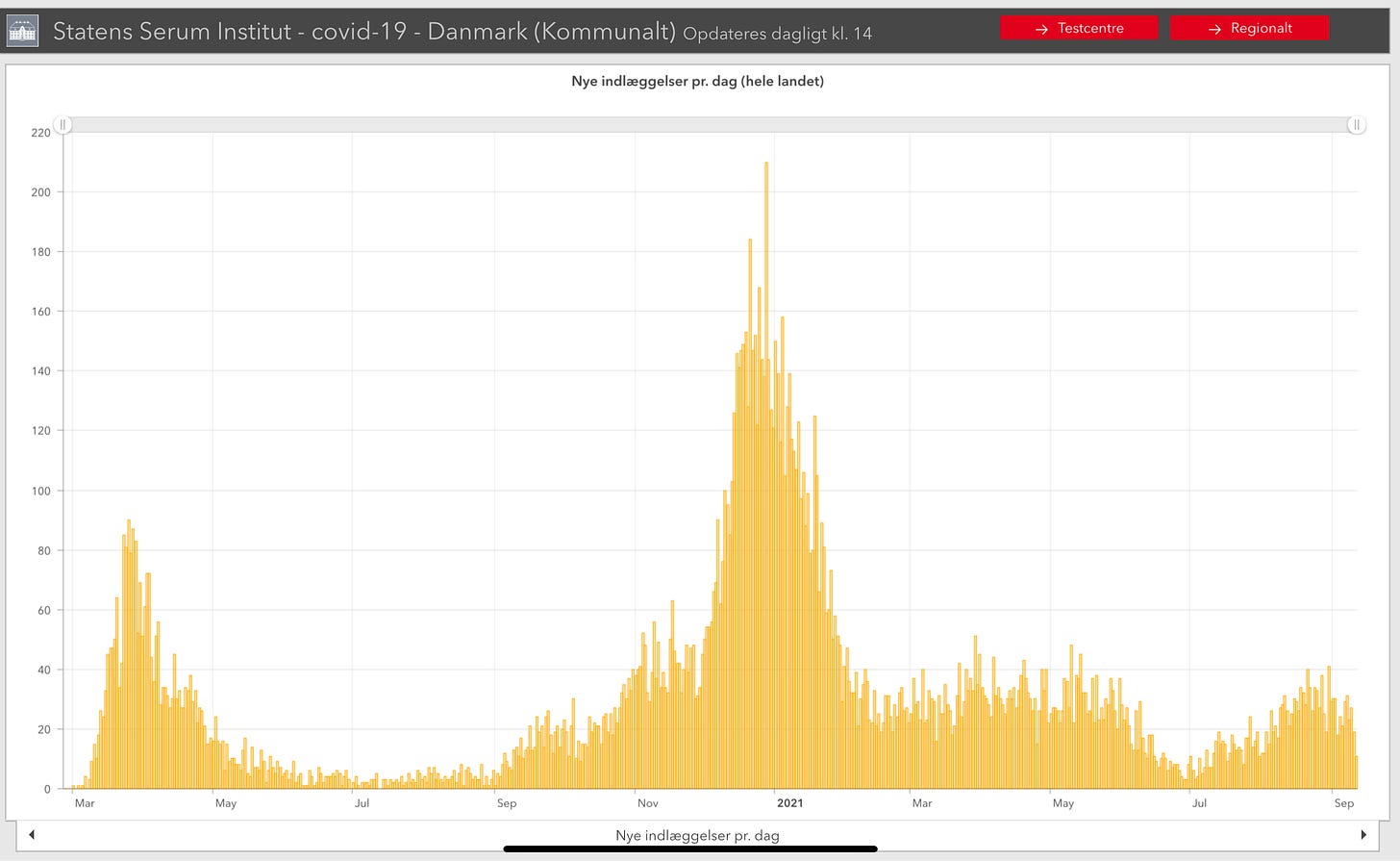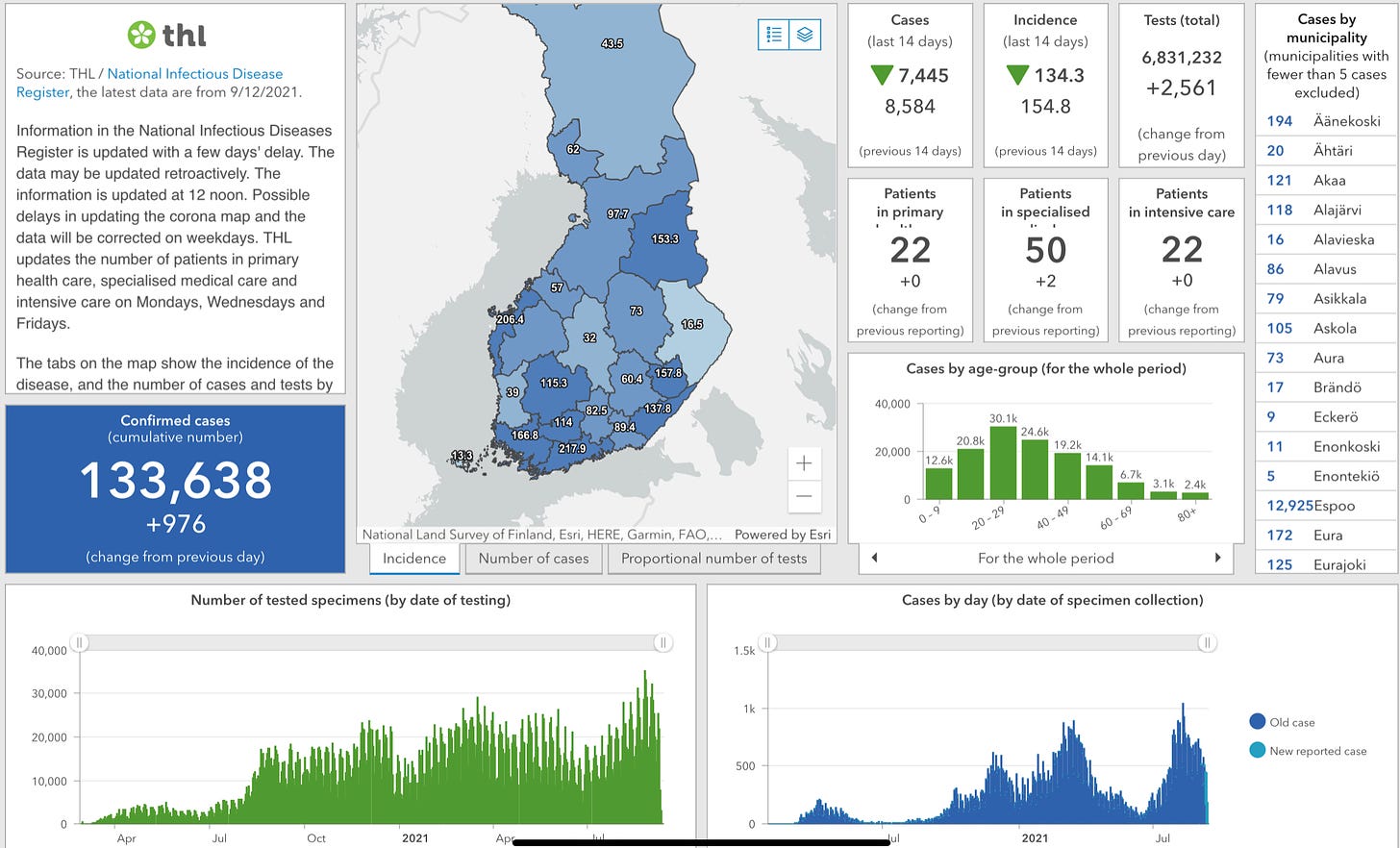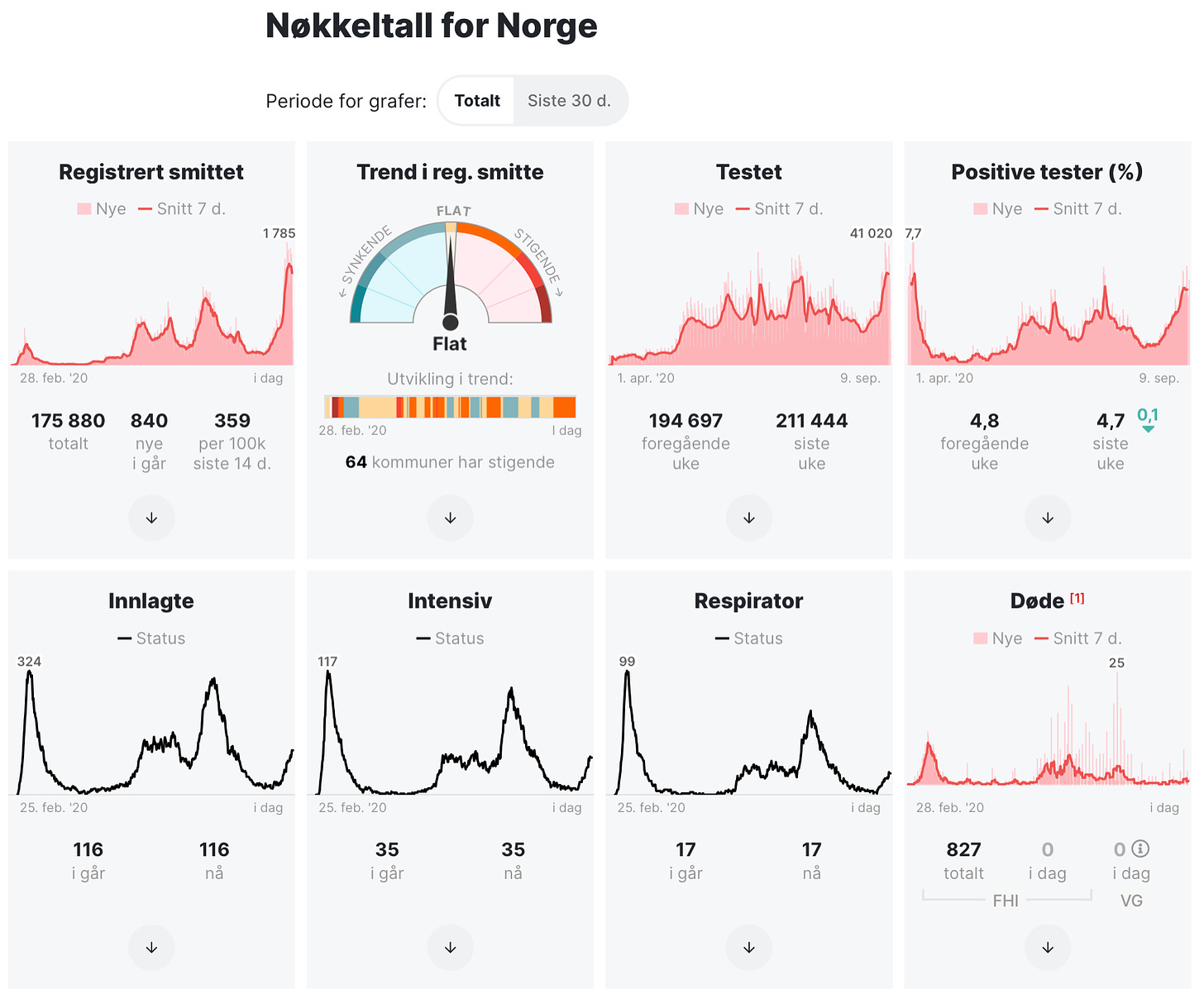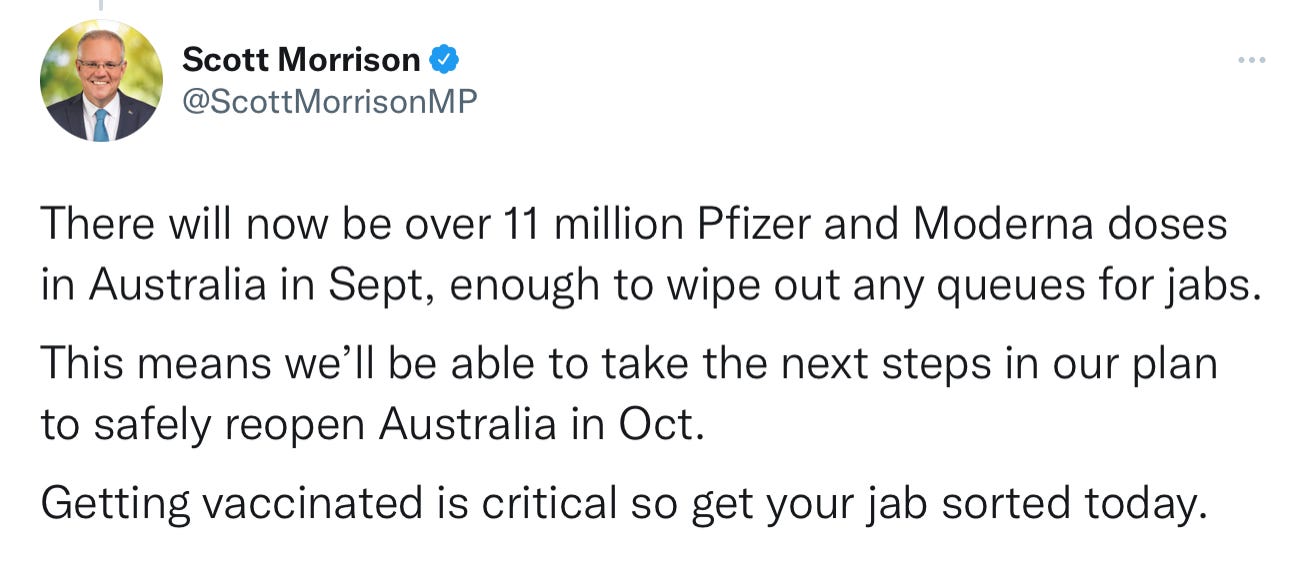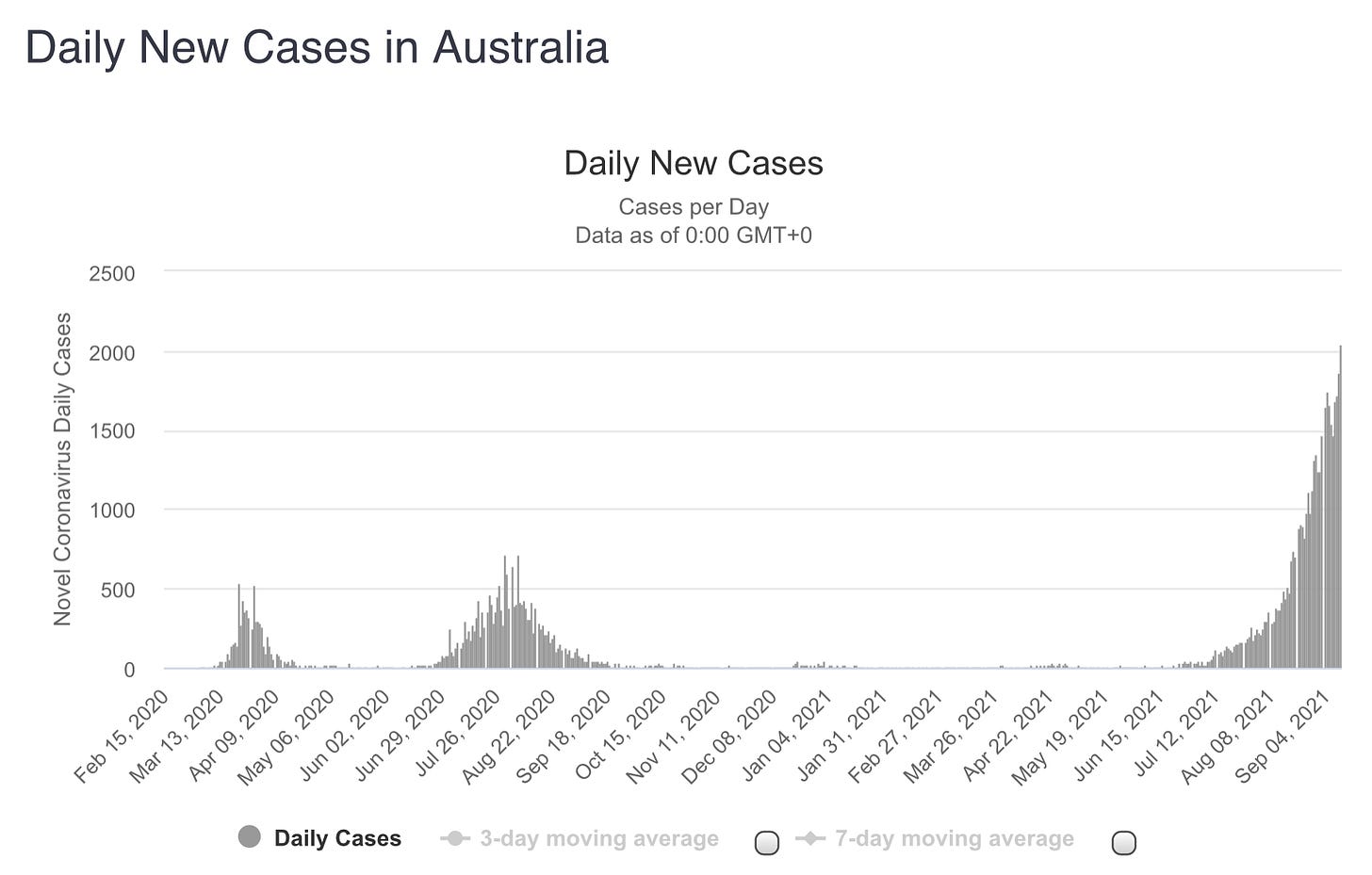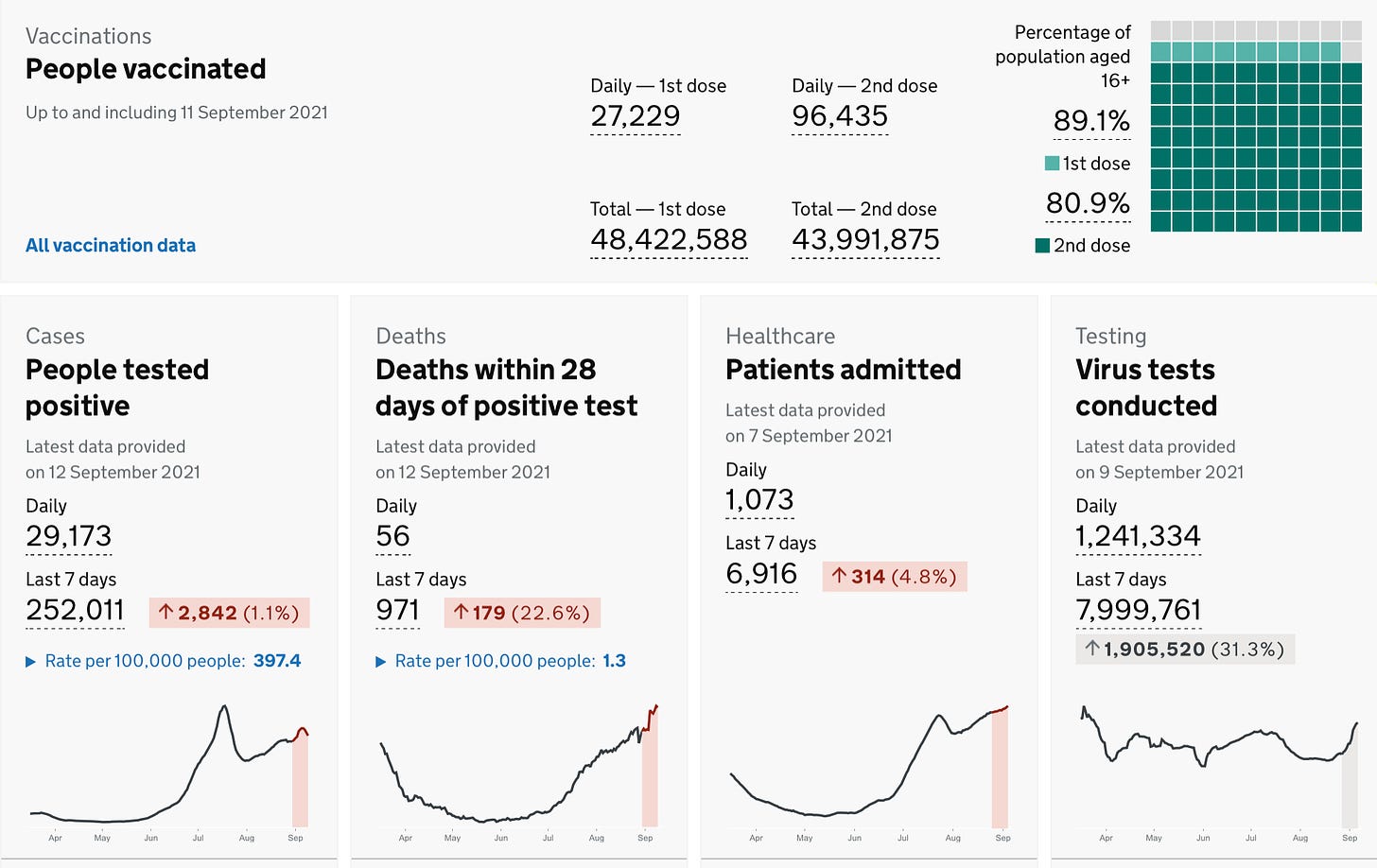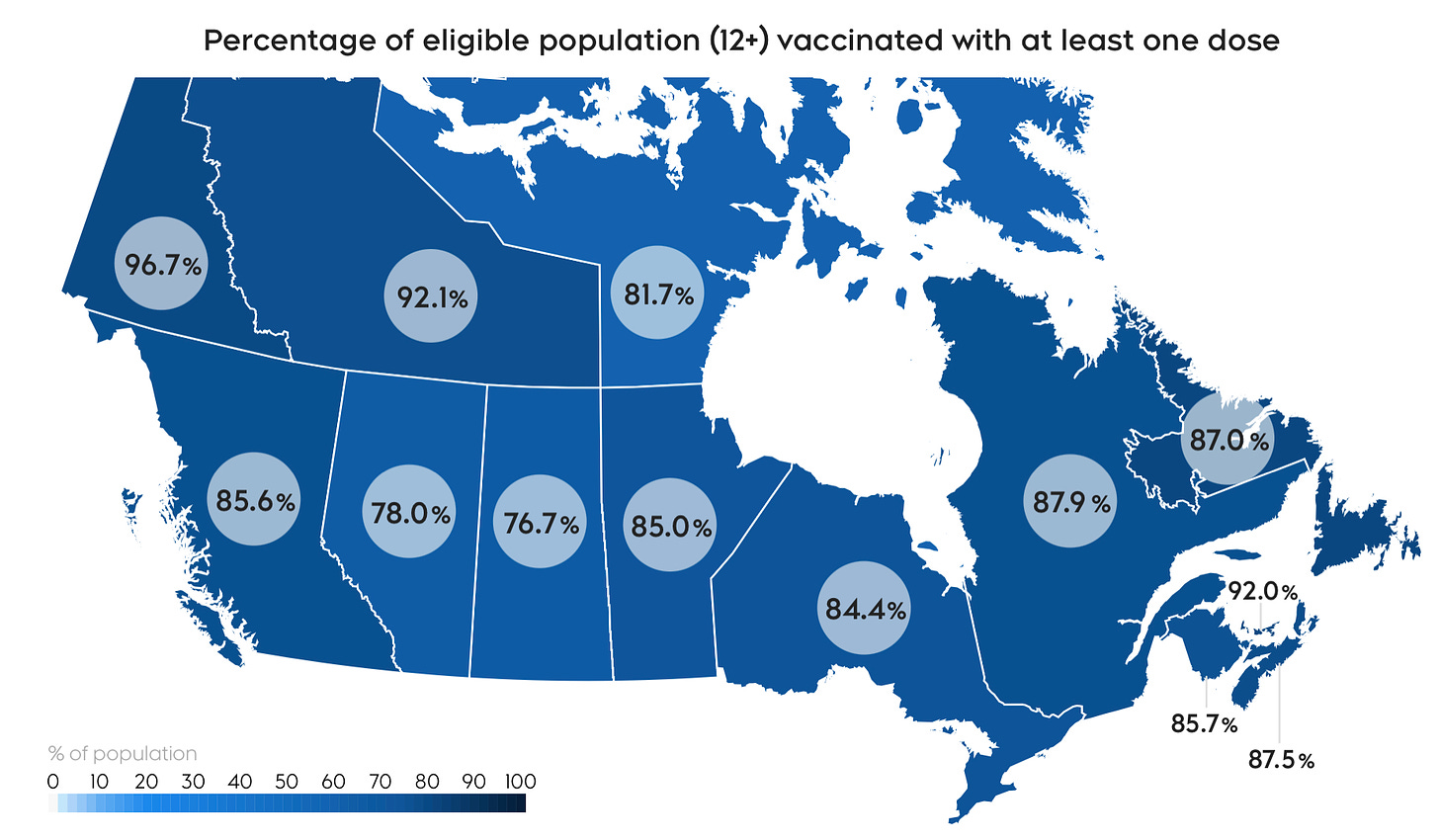🇩🇰 🇳🇿
Denmark has sold 500,000 doses of the Pfizer/BioNTech vaccine to New Zealand. Danish Health Minister Magnus Heunicke made the announcement on Sunday.
“From the beginning, we have invested heavily in buying a wide range of vaccines for the Danish population. Today we have a surplus of mRNA vaccines that we do not need at home, even though we are faced with having to give people a third shot. Excess vaccines must, of course, go out and contribute to the global pandemic fight.”
The doses will begin to be shipped from Denmark to New Zealand by tomorrow. The Danish Health Ministry says it is also “assessing the possibilities of donating additional vaccines.”
From New Zealand’s Prime Minister:
🇩🇰
It was almost like there was no pandemic at all. 50,000 people jammed into Parken in Copenhagen over the weekend for the Minds of 99 concert. It happened just one day after all the remaining COVID restrictions in Denmark had been lifted. A concert with huge crowds in numbers like this hasn’t been seen in the country since before the pandemic struck. However, as people streamed in to the show, there was a reminder that the fight against the coronavirus is not over yet.
Picture courtesy of @AndreasSteno/Twitter
The Danish Ministry of Health and the Ministry of Culture have collaborated to set up vaccination pop-up sites outside major events including the Saturday Minds of 99 concert. The next big event will be the Spot Festival in Aarhus and attendees will also be able to get vaccinated at pop-up sites there as well.
Minister of Culture Ane Halsboe-Jørgensen says other big events can expect the same.
“The more people who have been vaccinated, the safer it will be for everyone to take part in more cultural events. We need to reinvigorate cultural events, which have been hit hard during the epidemic, and therefore I am both really happy and proud that event organizers support the need for even more people to be vaccinated. By making it possible to get vaccinated in connection with selected major events, we hope, among other things, to be able to reach more young people under the age of 30."
Region Hovedstaden confirmed that 51 people took advantage of the vaccination opportunity at the Saturday concert.
-
While Denmark returns to as close to normal as you can get with an ongoing pandemic, some of the changes that took place in grocery stores may stick around. The Coop’s chain, which includes Kvickly, SuperBrugsen, Dagli’Brugsen, Irma, and Fakta, says it will keep hand sanitizer at entrances, distance markers on the floor, and dividers won’t be coming back at check-out.
Communications Manager Lars Aarup spoke to DR:
“Customers are happy to get hand sanitizer when they enter the store, so we will keep that service, and the distance stripes on the floor up to the checkout provide a fine customer flow.”
Signs of the pandemic will also be evident as some Fotex and Bilka stores, which as of last Saturday, now offer the chance to get vaccinated when you grocery shop.
National Health Board Director Søren Brostrøm spoke to DR:
“It is important that as many people as possible help to ensure that those who want it are actually vaccinated. Therefore, we are pleased that companies and organizations support the vaccination efforts.”
The hope is that by having the opportunity to get vaccinated in places like grocery stores, it will also help to get young people vaccinated. The 20 to 29 year old age group has the lowest vaccination rate of any age group.
-
The Danish Health Ministry says its alternate vaccination scheme, offering the one-shot Johnson & Johnson vaccine for a fee, will be up and running by tomorrow. The scheme will be aimed at tourists, Danes visiting home from abroad, and the key target group, seafarers.
The Johnson & Johnson vaccination offer will operate similarly to travel vaccination clinics and other private offers outside the state vaccination program. Companies authorized to purchase and administer the vaccine doses can order them through the Staten Serum Institut.
Anyone wanting to go this route to get vaccinated will need a prescription. They also must be duly informed about the risks and potential side effects of the Johnson & Johnson vaccine. And then before being inoculated, they must also give their informed consent.
While the primary focus will be setting up vaccination clinics at Danish ports the Sundhedsministeriet says there is also a possibility sites could also operate in airports. The main goal of this program is to get mariners who work on freighters who may not have access to vaccination programs in their own country, or who spend many months at sea, a COVID vaccine, regardless of their nationality.
The health ministry says the program will continue until there is no more demand or the supply of doses runes out, whichever comes first.
-
To date, enough 1st doses have been administered in Denmark to cover 75.6% of the total population and 73.3% are fully vaccinated.
Over the last week, 13,580 total 1st doses have been administered, boosting the percentage of the total population with at least one dose from 75.4% to 75.6%.
On Saturday, 7,624 total inoculations were done, and of those just 1,835 were first doses.
-
Region Nordjylland’s mobile vaccinations have another busy week ahead, with pop-up vaccination sites planned in five communities throughout this week. Teams will be offering vaccinations without an appointment to anyone who needs a first or second dose. They will be at locations in Løgstør, Farsø, Fjerritslev, Aabybro, and Hirtshals.
-
Region Sjælland began administering booster shots on Friday with vaccination teams at Christians Have Plejecenter in Solrød and Blomstergården Plejecenter in Slagelse.
The region says it has 140 senior care homes in its jurisdiction with more than 5,000 residents.
Regional Council chairman Heino Knudsen:
“We have developed enormous experience and capacity in the vaccination area, so when the National Board of Health asks us to give a third dose to nursing home residents, we were ready immediately.”
He expects a big uptake for the booster shots, noting they have already vaccinated 5,250 nursing home residents in the initial vaccination campaign. At Blomstergården in Slagelse, where they began administering third doses on Friday, 96% of the care home’s residents have already agreed to get another shot.
The region expects to wrap up its booster shot campaign aimed at seniors and people who are immunocompromised by the end of October.
-
Denmark’s Foreign Affairs Ministry made some more changes to its COVID risk assessment travel map over the weekend.
The most notable changes were for countries outside the European Union. One week after moving the United States to orange Albania, Armenia, Azerbaijan, Brunei, Japan, and Serbia have also become medium-risk orange. This means most travel to Denmark from those countries will require a negative COVID test. People who are fully vaccinated and children 16 and under traveling with a fully vaccinated person are exempt from the testing requirement.
Within the EU there have been some tweaks at the regional level but everything else stays the same. The Italian region of Friuli-Venezia Giulia, the regions of Burgenland and Carinthia in Austria, and the Sjeverna-Hravatska area of Croatia all move to be cautious yellow.
Turning near-normal green are the Italian region of Lazio and the Azores region of Portugal.
-
Denmark has added 1,377 COVID infections and seven more coronavirus deaths since its Thursday update. It reported 557 infections on Friday, 386 Saturday, and another 434 on Sunday.
-
COVID hospitalizations (125) have inched upward (+1) while the number of infected people in an ICU (32) and of those on a ventilator (19) are both unchanged day to day.
-
Hospitals in Region Midtjylland are under growing pressure and senior officials are now issuing a public plea for patience. The hospitals are dealing with the fallout of the nurses strike, which has caused 10,789 outpatient visits and 4,684 surgeries to be postponed since week 25. In addition, hospitals throughout the region are under pressure from what it called “an extraordinary number of acute patients.” Those patients will need priority treatment, further pushing non-urgent procedures further down the line.
Executive Vice President Ole Thomsen:
“The hospitals are in a difficult situation right now. Therefore, I would like to appeal to all citizens to show understanding that things will not go back to the way they were before the COVID pandemic with the snap of a finger. I am saddened by the situation and have the greatest understanding of the frustration you as a citizen experience by having your treatment canceled, or postponed, perhaps for the second time. But it's not the individual employee's fault. So I would like to encourage patience and some understanding as we try to reach a deal in contract negotiations.”
He says the region expects the situation to get worse before it gets better. Nurses who are on strike now will have holiday time they haven’t taken during the labour dispute once a deal is reached. This will likely mean that more outpatient visits and surgical procedures could be delayed.
🇸🇪
Sweden doesn’t update its COVID statistics on weekends and it will provide its first update of the week on Tuesday.
-
Pressure continues to build on hospitals in Sweden’s capital region, except this time it is on two fronts from both the coronavirus and other respiratory diseases. Region Stockholm says it has 120 COVID patients in hospitals going into the weekend, which is six more than its last assessment on Tuesday of last week. The health authority says since week 24, 75% of all coronavirus admissions have been people who are not vaccinated and 15% have been people with just one dose.
Acting Director of Health and Medical Care Johan Bratt:
“It is ominous that we have so many patients with COVID in our hospitals. This has a number of negative consequences. For patients, it can in many cases be difficult treatment over a long period of time.”
Bratt also warns this isn’t just about COVID, as the embattled Swedish health system has had to delay or postpone so many procedures due to the pandemic. Now, at a time when they should be focusing on clearing the backlog, they are just creating more of it.
“It does not only affect patients with COVID. Many thousands of patients are waiting for care that we have had to postpone due to the pandemic. With so many coronavirus patients still, it becomes more difficult to work expeditiously to administer all the care that has been postponed.”
Bratt says the best way to protect against serious coronavirus cases that result in hospitalization and possibly death is to get vaccinated. He is urging anyone who hasn’t yet gotten their shots to do it as quickly as possible. He says the need is urgent now because the government will lift COVID restrictions on September 29, increasing the risk for those without vaccine protection.
The region says the healthcare system is strained not just with the influx of COVID cases but also because they are shorted staffed “because employees are at home with any of the other infectious diseases that are flourishing in the region right now.”
🇫🇮
Finland has registered 1,466 new COVID cases since its Thursday update. It reported 490 infections on Friday, and then an technical issue prevented a Saturday report. On Sunday there were 976 cases covering a 48 hour period.
To date, 4,079,776 1st vaccine doses (72.9% of the total population) have been administered while 3,139,204 people (56.2%) are now fully vaccinated.
-
About 71 people will get a third vaccine shot in the Finnish town of Kokkola, but in their case it won’t be a booster shot but rather a catch-up dose. A vaccination centre in the city switched syringe models back in August and it resulted in administering 71 partial doses of the vaccine. After consulting with the Finnish Institute for Health, it was decided to offer the impacted people a third dose to ensure they had full two-dose protection. Health officials in the region have been tracking down everyone impacted and have already begun administering catch-up inoculations.
🇳🇴
Norway added 3,411 infections and has had no new corona deaths since its Thursday update.
COVID hospitalizations (116) have jumped in the last three days (+12) while the number in an ICU (35) edged downward (-1) and of those, the number on a ventilator (17) inched down as well (-1).
To date, 73.40% of Norwegians have had one vaccine dose and 63.63% have had both doses.
-
Norway will offer booster shots for a select group of immunocompromised people. The Norwegian Institute of Public Health says the third COVID vaccine shot will be administered in two groups.
Group 1
This group will be offered a vaccine booster “as soon as practically possible.” The people who qualify are those with…
Organ transplants
Bone marrow transplant in the last 2 years
Severe and moderate congenital immunodeficiency
Severe renal failure (stage 5) or active dialysis
Advanced or untreated HIV infection
Group 2
Booster shots will be doled out within this group based on the assessment by the specialist health service. They will identify patients who should get a third dose. Patients in the following groups will be under consideration and if selected for a booster shot then they will be invited directly.
Cancer patients with active or recently undergone immunosuppressive therapy.
Patients undergoing significant immunosuppressive therapy for other reasons.
Patients who by a responsible medical specialist are considered to have a severely impaired immune system and who are not part of one of the groups above.
At this point, Norway will only offer booster shots to adults with severely weakened immune systems and not children. NIPH Chief Physician Sara Viksmoen Watle says that there is no basis at this point for offering booster doses to immunocompromised children. However, there may be some individual exceptions where a booster shot may be deemed necessary. A pediatrician would make that assessment.
“People who have severely weakened immune systems should still take precautions when there is a lot of infection in society. They may be vulnerable to severe cases of COVID even after an additional dose of the vaccine. In addition, it is important that close contacts in the same household get vaccinated. This may help reduce the likelihood of infection for household members who may have a poorer vaccine response.”
🇪🇺 🇦🇺
Australia has reached a deal with the European Union to buy one-million doses of the Moderna vaccine. The doses will begin to be shipped to Australia this week. The Australian Prime Minister’s office says the doses were surplus vaccines from Spain, the Czech Republic, Portugal, and Bulgaria.
Australian Prime Minister Scott Morrison:
“I’d like to thank the European Commission and partnering countries for their cooperation, and Sweden and Norway for their assistance. I also thank Moderna, with whom we have also worked closely to secure this arrangement.”
Morrison also said the country has also authorized the Moderna vaccine for use on children as young as 12 years old. He called the influx of vaccine doses “a family sized dose of hope.”
Australia is seeing an infection wave sending the daily number of reported COVID cases or record highs as the Delta variant rampages across the country. It reported over 1,600 new cases just yesterday.
🇬🇧
In an abrupt U-turn, the British Government is scrapping plans for a vaccine passport system to enter nightclubs and large events in England. The BBC is reporting the plan fell apart in the face of opposition from nightlife venues, Tory MPs, and the Liberal Democrats. The now scrapped legislation was set to be tabled soon, with Vaccines Minister Nadhim Zahawi saying just last week the vaccine passport system would be in place by the end of September.
The UK reported 29,173 COVID infections yesterday and another 56 fatalities. The rate of positive tests, deaths, and hospitalizations have all increased over the last seven days albeit only slightly.
💉
Pfizer/BioNTech will apply for an authorization for use of its COVID vaccine on children between five to 11 years old. BioNTech CEO Ozlem Tureci spoke to Der Spiegel on Friday.
"Over the weeks ahead we will submit the results of our study on 5-to-11-year-olds to the authorities worldwide and apply for approval for this vaccine for these age groups, here in Europe as well.”
She said the company is currently assessing data from clinical trials, which included children as young as six months old. The results are expected to be published by the end of the year. But BioNTech isn’t waiting and has already begun preparing to produce its vaccine for children, which will be a smaller-dose version of the adult vaccine.
🇨🇦
Public Health Canada is no longer updating the COVID dashboard on weekends. We will have to wait until later today to get a better sense of the pandemic situation.
-
The Canadian vaccination campaign has so far administered 28,311,937 1st vaccine doses (74.36% of the total population) while 26,021,987 people (68.35%) are fully vaccinated.
The coronavirus wasted no time in making its presence felt in the first week of back to school in Canada. Students from Prince Edward Island to Ontario tested positive, resulting in well over 200 students being sent home due to possible exposure to COVID. A number of classes have also been canceled.
-
Ontario recorded 1,641 infections over the weekend and of those 1,248 were people who were not vaccinated or who had just a single dose. The province reported 857 new cases Saturday and then another 784 on Sunday. Currently there are 289 people in hospital and 184 in an ICU.
Quebec reported 757 new infections and no new deaths on Sunday.
There were 420 new infections and three more deaths in Saskatchewan yesterday. 190 people are currently hospitalized, a number that has increased by almost 40% in just the last week.




